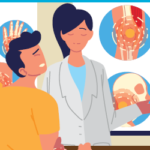On a chilly March morning in Lancaster, Ohio, rheumatologist Stephanie Ott, MD, shared the Ohio Association of Rheumatology’s (OAR) current advocacy efforts with ACR@Work between walking her three dogs and driving to her clinic to see patients—some of whom travel from as far away as West Virginia.
“This year, we are really focusing on legislation to reform step therapy, and finding sponsors for a new bill on non-medical switching,” says Dr. Ott, in her sixth year as the state society’s president. She and other Ohio rheumatologists fight against pressure by insurers to switch patients to cheaper treatments when they’re stable on their current drug.
In early March, she represented rheumatologists as part of the Ohio Step Therapy Coalition, a group of physician, patient, and stakeholder groups who advocate for patients’ rights to remain on the medications that have been working for them, even if they switch insurance providers. In 2016, the coalition also worked to expedite and simplify prior authorizations in the state.
OAR at Work
The OAR has about 70 current members, 50 of whom attended last year’s annual advocacy day at the Ohio State Capitol in Columbus, says Dr. Ott. At this year’s event on May 4, they will speak to legislators against the state’s Medicare carrier’s recent move to downcode infusions of abatacept (Orencia), golimumab (Simponi Aria) and tocilizumab (Actemra), and injections of certolizumab pegol (Cimzia).
“Downcoding greatly affects our reimbursements. It’s not as if our nurse has to have less training to administer these drugs. Now, we make less money on the same treatment we have been providing, and we still have to pay the same amount for the acquisition of the drugs and the training,” says Dr. Ott. “Unfortunately, we haven’t been able to get this overturned yet, but I am not done fighting.”
Strength in Numbers
In advocacy, there is strength in numbers, she says, and she urges rheumatologists to attend state or federal advocacy days, such as the ACR’s annual Advocates for Arthritis event in Washington, D.C., which takes place Sept. 17–19, 2017.
“It takes so little effort to get on the radar of state legislators. They really react when you email or call and say, ‘This is an important issue.’ If you have an important issue and you get enough people to show up, it makes an impact,” she says. There are only five rheumatologists practicing in her region, South Central and Southwest Ohio. “So improving access to rheumatologists and treatment is so important.”



